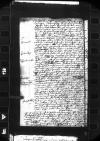Wir schicken dissen unsern kamerdiner, / den uns E(wer) H(erlichkei)t gegeben, / uff das an ⌊ko(nigliche)r m(ajeste)t⌋ co(m)mission erfurdrung bittend, wolt im roten und helffen, do mit im nichts, darzu her fueg und recht hoth, / enczogen wurd.
In dem negsten ⌊⌋, das an superinscribed in place of crossed-out von⌈von an an superinscribed in place of crossed-out von⌉ uns disser unser kamer diner von superinscribed in place of crossed-out an⌈an von von superinscribed in place of crossed-out an⌉ E(wer) H(erlichkei)t getr written over r⌈rrr written over r⌉agen, / meldet E(wer) H(erlichkei)t wirt gemeldet, wie das wu es besser wer gewesen, / das wir Euch hetten sollen rothen in der sache nicht zu eilen(n) und in weiters written over n(n)⌈n(n)ss written over n(n)⌉ bedencken zuvorczyhen, / so wer a written over e⌈eaa written over e⌉u[...] hidden by binding⌈[...][...] hidden by binding⌉ besser gerothen. / Dieweil on the margin in place of crossed-out Bis⌈Bis Dieweil Dieweil on the margin in place of crossed-out Bis⌉ E(wer) H(erlichkei)t solchen gutten roth bey sich gehath hoth, / nympt uns wunder, das die roth bey uns gesucht hoth theth suchen, / unser gutdunckenn(n) in dem fhal, / das wir getreulich on the margin⌈getreulichgetreulich on the margin⌉ uff E(wer) H(erlichkei)t bethe noch unserm(m) besten vorstande haben von uns horen lossen, / wolle wir vor Gothe dem almechtig(en), / der iderman heist gebn(n) das seine, ouch superinscribed⌈ouchouch superinscribed⌉ vor ⌊ko(nigliche)r m(ajeste)t⌋ und allen stenden uffrichtig bekant sein. / Es ist ein alt sprich wort, / ein roth ist kein geboth, hir inne hot on the margin⌈hir inne hothir inne hot on the margin⌉ E(wer) H(erlichkei)t hoth mocht an nhemen(n) und thun noch irem gefallen superinscribed in place of crossed-out ...⌈... illegible⌈...... illegible⌉ gefallen gefallen superinscribed in place of crossed-out ...⌉. / Wir habens (: Got sey unser geczeug :) getrewlich gemeint, / wirt uns ouch billicher weis nymant mugen anders aus legen(n) etc.
Dass(?) wir aber solten zcornen(n), / wie E(wer) H(erlichkei)t unserm ⌊amptman⌋ u written over z⌈zuu written over z⌉ff ⌊Fridek⌋ hot angeczeigt, / ist nicht unser profession. / Wir sein schuldig nicht allein nicht zu zcornen(n), / sunder ouch den(e)n die, welche on the margin⌈welchewelche on the margin⌉ uns vorfolgen und vil arges zutreiben und thun, / lieb zu haben, / in wol reden guts vor böss erczegen on the margin in place of crossed-out ⌈guts vor böss erczegenguts vor böss erczegen on the margin in place of crossed-out ⌉ / und Goth vor sie bitten(n), / welchem wir, / so vil uns gotliche gnad hulffe thuth (: von uns selbst muge wir solchs nicht haben(n) :) noch unserm(m) besten vormugen thun noch seczen(n). /
Vor den fruntlichen willen, / das E(wer) H(erlichkei)t noch laut ⌊ko(nigliche)r m(ajeste)t⌋, u(nsers) a(llergnedigsten) h(e)rn schrifftlichen befhel / unser schuldiger des pflug getreides dar zu vil halten, / do mit uns das jenige von in werde, das sie pflichtig sein, / thue wir E(wer) H(erlichkei)t fruntlich dancken bittend, solchs wolde zu gange fortstellen on the margin⌈fortstellenfortstellen on the margin⌉ und in ein execucion bringen(n). / Welchs wir um(m)b die selbtige E(wer) H(erlichkei)t, / die wir Gothe in gutter langer gesuntheit und wolfart thun befhelen, / alweg gern und fruntlich wollen beschulden. /

 AAWO, AB, D7, f. 36v
AAWO, AB, D7, f. 36v